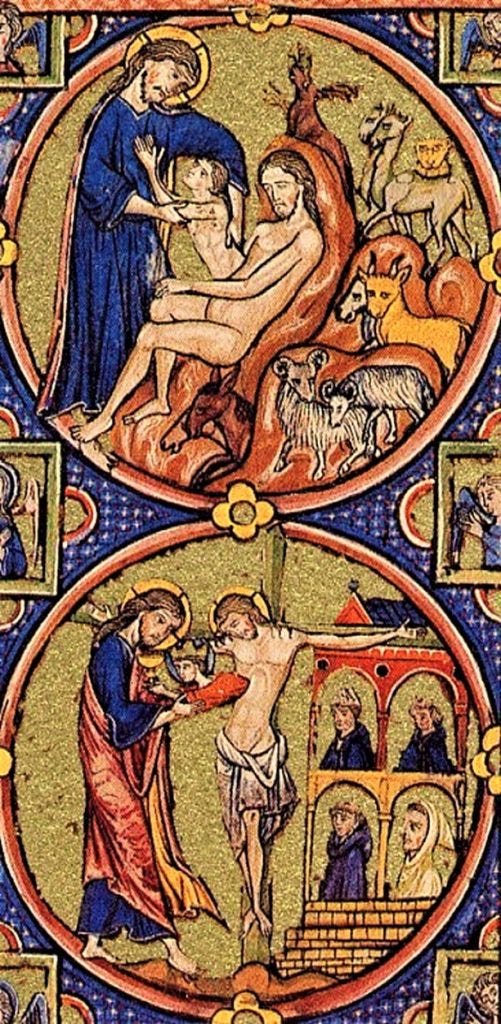1 A psalm of David, when he fled from his son Absalom.
2 How many are my foes, O LORD! How many are rising up against me!
3 How many are saying about me, “There is no help for him in God.”
4 But you, LORD, are a shield about me, my glory, who lift up my head.
5 I cry aloud to the LORD. From his holy mountain he answers me.
6 I lie down, I sleep and I wake, for the LORD upholds me.
7 I will not fear even thousands of people who are ranged on every side against me.
Arise, LORD; save me, my God,
8 you who strike all my foes on the cheek, you who break the teeth of the wicked!
9 Salvation belongs to the LORD; may your blessing be on your people!
Placing Psalm 3 in the Scriptures
If the first psalm, writes Cassiodorus, considers Christ’s “moral aspect,” then the second considers his “natural aspect, that is, his human and divine being.” The third psalm completes the three “wellsprings” which run throughout the Scriptures and considers what Cassiodorus calls Christ’s “reflective aspect.” This may be described as the events of his life, specifically the Paschal mystery, seen in Psalm 3 with the language of death and resurrection (“I lie down, I sleep and I wake, for the LORD upholds me....Surge, Domine!”). Having noted these three aspects, writes Cassiodorus, we will be able to recognize them as they appear (together or individually) in other Psalms and Scriptures.
Absalom and the Lies of our Enemies
Psalm 3 may be taken in two parts. The first addresses the Father and sets up the tension at hand: “How many are my foes, O LORD! How many are rising up against me! How many are saying about me, ‘There is no help for him in God.’” And the second consoles the faithful, revealing the “help brought by God” (cf. St. Thomas). In commenting on the first part, we will focus on the historical and typological sense; in the second, we will consider the moral and anagogical sense.
Psalm 3 is the first to include an historical title. It was written by David as he fled from Absalom, his son who incited rebellion and tried to seize the throne. David’s foes were indeed many, and he fled to the Mount of Olives, weeping “without ceasing” (2 Sam 30). A thousand years later, a man whose soul was “sorrowful even unto death,” and whose enemies were rising up against him went to pray on the very same mountain before his Passion. As one person initiated the rebellion against David, so did one person instigate Christ’s betrayal. The commentators, therefore, all read Absalom as a type of Judas. Famously, Absalom was killed by Joab and his men (against David’s wishes) after they found him hanging from an oak tree. As his mule ran underneath the tree while fleeing David’s army, Absalom was caught by his hair and “hung between heaven and earth” (2 Sam 18). Similarly, note the Fathers, Judas met his end hanging from a tree.
“There is no help for him in God.” Many times when we see the word ‘help’ in the Old Testament, the Hebrew is יְשׁוּעָה (yeshuah). It means salvation, “God saves,” and is the name the angel Gabriel tells Mary to name her son. “There is no salvation for him in God.” “There is no Jesus in God.” These are the words of the enemies. They are the words we hear spoken to us when tempted to despair of God’s goodness. “God can’t really save us.” “There is no salvation for us in Him.”
Salvation in God
But there is salvation in God, and Jesus is God. Without knowing the Messiah, David knows that our help is in the name of the Lord. “But you, O Lord, are a shield around me.” It is only someone with such confidence in the Lord who cries aloud to him, as St. Augustine writes, “not with the voice of the body, which is drawn out with the sound of the reverberation of the air; but with the voice of the heart, which to men speaks not, but with God sounds as a cry.” Only the person with great confidence in the Lord can lie down and sleep amidst the onslaught of enemies.
The words translated as “lie down”, “sleep”, “wake”, and “upholds”' are worth considering more closely. Where the Hebrew uses שָׁכַב (shachav, to lie down or recline), the Greek uses the passive aorist of κοιμάω (koimao), and the Latin uses dormire (to sleep). The next word is seemingly redundant, simply another form of sleeping or slumbering: יָשַׁן (yashan), ὑπνόω (hypnóo, where we get hypnosis), or soporare (to stupefy). But rather than a simple synonym, it is a deeper sleep. As the Fathers pick up on, it is the sleep God cast on Adam when He brought forth Eve from his side, and it is the sleep of death Christ underwent when from his side the Church was brought forth. From this slumber, the Psalmist awakens vigilant (cf. Isaiah 26:19, Daniel 12:2), ready to bear summer fruit, which shares the same root as קוּץ (quts, to awaken).
All of this sleeping, slumbering, and rising is only possible if God is with us. He “upholds” us. The Greek word shares a root with the word for “shield”, and in the Hebrew, it implies something to lean against or rest upon; God both surrounds us as protection and is the bed upon which we may rest. Only great trust in this protection renders one unafraid in the face of thousands (“myriads”, also the word for countless) of people “who are ranged on every side against me.” This and the cry of “Arise, O Lord!” is the voice of Christ to the Father who both entreats the divine help present to him and consoles the faithful to not fear death and to hope in the resurrection (cf. Cassiodorus, St. Thomas). Cassiodorus uses these middle verses against the Pelagians, who rely on their own strength. But for the Christians who have taken untroubled rest in the Lord, “rising up means eagerly getting up again, for the flesh laid aside its mortality and embraced immortality and eternal glory.” We sleep and rise because the Lord sustains us. And we can do this because for Christ, the power to lay down his life and the power to take it up again belongs to him.
Jesus tells the Pharisees in Matthew 15 that “the things that come out of the mouth come from the heart, and they defile.” In this spirit we pray at the end of Psalm 19, “May the words of my lips and the meditation of my heart be acceptable to you, O Lord, my rock and my redeemer.” What is born in the heart makes its way to the lips, for good or ill. The teeth, related to the Hebrew word for “sharp”, represent the sharp words of cursing uttered by the followers of Absalom, which separate them from the king. In the moral sense, they are our errors and sins which separate us from Christ. With her own sharp teeth, the Church will cut away sin and heresy. With her powerful and merciful blow, she will shatter the defilement that comes from heart and mouth. For as the Psalmist knows and concludes, “Salvation belongs to the Lord.” Jesus is our יְשׁוּעָה (yeshuah), our salvation, our final end and Common Good, whose very name effects the thing it signifies. In this we may sleep and rise.
א מִזְמוֹר לְדָוִד: בְּבָרְחוֹ, מִפְּנֵי אַבְשָׁלוֹם בְּנוֹ.
ב יְהוָה, מָה-רַבּוּ צָרָי; רַבִּים, קָמִים עָלָי
ג רַבִּים, אֹמְרִים לְנַפְשִׁי: אֵין יְשׁוּעָתָה לּוֹ בֵאלֹהִים /סֶלָה.
ד וְאַתָּה יְהוָה, מָגֵן בַּעֲדִי; כְּבוֹדִי, וּמֵרִים רֹאשִׁי.
ה קוֹלִי, אֶל-יְהוָה אֶקְרָא; וַיַּעֲנֵנִי מֵהַר קָדְשׁוֹ /סֶלָה.
ו אֲנִי שָׁכַבְתִּי, וָאִישָׁנָה; הֱקִיצוֹתִי--כִּי יְהוָה יִסְמְכֵנִי
לֹא-אִירָא, מֵרִבְבוֹת עָם-- אֲשֶׁר סָבִיב, שָׁתוּ עָלָי ז
ח קוּמָה יְהוָה, הוֹשִׁיעֵנִי אֱלֹהַי-- כִּי-הִכִּיתָ אֶת-כָּל-אֹיְבַי לֶחִי
שִׁנֵּי רְשָׁעִים שִׁבַּרְתָּ
ט לַיהוָה הַיְשׁוּעָה; עַל-עַמְּךָ בִרְכָתֶךָ /סֶּלָה.
Ψαλμὸς τῷ Δαυΐδ, ὁπότε ἀπεδίδρασκεν ἀπὸ προσώπου Ἀβεσσαλὼμ τοῦ υἱοῦ αὐτοῦ
2 Κύριε, τί ἐπληθύνθησαν οἱ θλίβοντές με; πολλοὶ ἐπανίστανται ἐπ᾿ ἐμέ·
3 πολλοὶ λέγουσι τῇ ψυχῇ μου· οὐκ ἔστι σωτηρία αὐτῷ ἐν τῷ Θεῷ αὐτοῦ. (διάψαλμα).
4 σὺ δέ, Κύριε, ἀντιλήπτωρ μου εἶ, δόξα μου καὶ ὑψῶν τὴν κεφαλήν μου.
5 φωνῇ μου πρὸς Κύριον ἐκέκραξα, καὶ ἐπήκουσέ μου ἐξ ὄρους ἁγίου αὐτοῦ. (διάψαλμα).
6 ἐγὼ ἐκοιμήθην καὶ ὕπνωσα· ἐξηγέρθην, ὅτι Κύριος ἀντιλήψεταί μου.
7 οὐ φοβηθήσομαι ἀπὸ μυριάδων λαοῦ τῶν κύκλῳ συνεπιτιθεμένων μοι.
8 ἀνάστα, Κύριε, σῶσόν με, ὁ Θεός μου, ὅτι σὺ ἐπάταξας πάντας τοὺς ἐχθραίνοντάς μοι ματαίως, ὀδόντας ἁμαρτωλῶν συνέτριψας.
9 τοῦ Κυρίου ἡ σωτηρία, καὶ ἐπὶ τὸν λαόν σου ἡ εὐλογία σου.
Canticum David cum fugeret a facie Absalon filii sui.
2 Domine, quare multiplicati sunt hostes mei? Multi consurgunt adversus me;
3 multi dicunt animae meae, “Non est salus huic in Deo.” /semper/
4 Tu autem, Domine, clipeus circa me: gloria mea et exaltans caput meum.
5 Voce mea ad Dominum clamabo, et exaudiet me de monte sancto suo. /semper/
6 Ego dormivi et soporatus sum; evigilavi quia Dominus sustentavit me.
7 Non timebo milia populi quae circumdederunt me. Surge Domine! Salvum me fac Deus meus,
8 quia percussisti omnium inimicorum meorum maxillam; dentes impiorum confregisti.
9 Domini est salus; super populum tuum benedictio tua. /semper/





